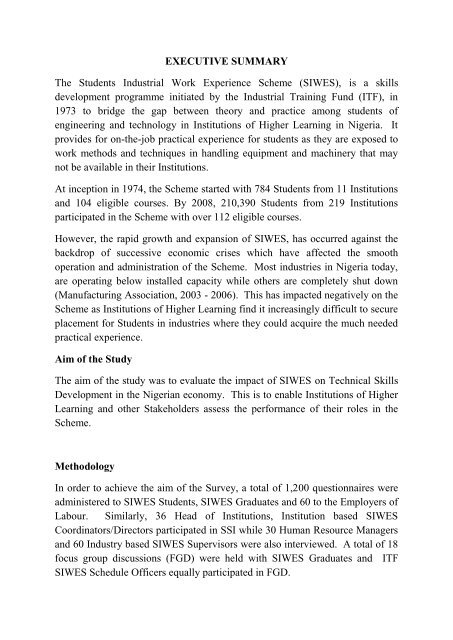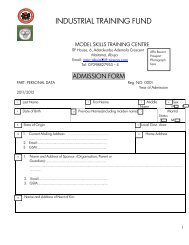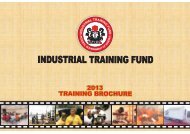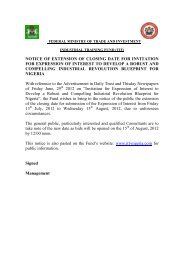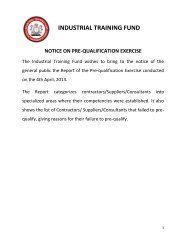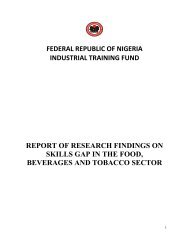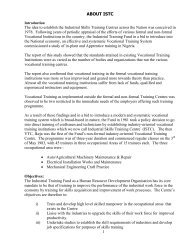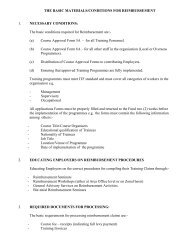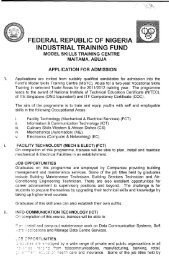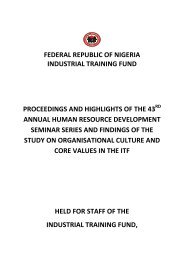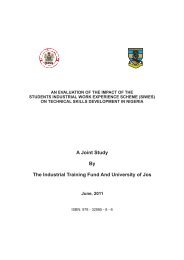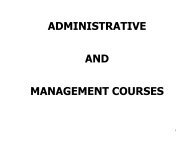EXECUTIVE SUMMARY The Students Industrial Work ... - ITF Nigeria
EXECUTIVE SUMMARY The Students Industrial Work ... - ITF Nigeria
EXECUTIVE SUMMARY The Students Industrial Work ... - ITF Nigeria
You also want an ePaper? Increase the reach of your titles
YUMPU automatically turns print PDFs into web optimized ePapers that Google loves.
<strong>EXECUTIVE</strong> <strong>SUMMARY</strong><strong>The</strong> <strong>Students</strong> <strong>Industrial</strong> <strong>Work</strong> Experience Scheme (SIWES), is a skillsdevelopment programme initiated by the <strong>Industrial</strong> Training Fund (<strong>ITF</strong>), in1973 to bridge the gap between theory and practice among students ofengineering and technology in Institutions of Higher Learning in <strong>Nigeria</strong>. Itprovides for on-the-job practical experience for students as they are exposed towork methods and techniques in handling equipment and machinery that maynot be available in their Institutions.At inception in 1974, the Scheme started with 784 <strong>Students</strong> from 11 Institutionsand 104 eligible courses. By 2008, 210,390 <strong>Students</strong> from 219 Institutionsparticipated in the Scheme with over 112 eligible courses.However, the rapid growth and expansion of SIWES, has occurred against thebackdrop of successive economic crises which have affected the smoothoperation and administration of the Scheme. Most industries in <strong>Nigeria</strong> today,are operating below installed capacity while others are completely shut down(Manufacturing Association, 2003 - 2006). This has impacted negatively on theScheme as Institutions of Higher Learning find it increasingly difficult to secureplacement for <strong>Students</strong> in industries where they could acquire the much neededpractical experience.Aim of the Study<strong>The</strong> aim of the study was to evaluate the impact of SIWES on Technical SkillsDevelopment in the <strong>Nigeria</strong>n economy. This is to enable Institutions of HigherLearning and other Stakeholders assess the performance of their roles in theScheme.MethodologyIn order to achieve the aim of the Survey, a total of 1,200 questionnaires wereadministered to SIWES <strong>Students</strong>, SIWES Graduates and 60 to the Employers ofLabour. Similarly, 36 Head of Institutions, Institution based SIWESCoordinators/Directors participated in SSI while 30 Human Resource Managersand 60 Industry based SIWES Supervisors were also interviewed. A total of 18focus group discussions (FGD) were held with SIWES Graduates and <strong>ITF</strong>SIWES Schedule Officers equally participated in FGD.
<strong>The</strong> six geo-political zones of the country and the 27 Area Offices of the <strong>ITF</strong>were the bases for sampling. <strong>The</strong> fieldwork for this study lasted two weeks inDecember 2008 across the Six Geo-Political Zones. <strong>The</strong> field personnel enjoyedcooperation and support of SIWES participating Institutions and theirrepresentatives during data collection. A few Researchers did not, however,receive cooperation of Employers of Labour to administer instruments to<strong>Students</strong>, largely due to either misconceptions or disputes.Lack of uniform academic calendar for all Institutions, including SIWEScalendar affected the capacity of Research Teams to administer some ResearchInstruments.Major Findings<strong>The</strong> findings of the survey include:1. Most <strong>Students</strong> (75%) described SIWES as very relevant toTechnical Skills Development, while SIWES Graduates (92.5%)reported that they acquired new skills during their SIWESattachment.2. Inadequate funding for the smooth management of the Scheme.3. Inadequate/ineffective supervision of <strong>Students</strong> on attachment byStaff of Institutions, <strong>ITF</strong> and Employers of Labour, largely due tolack/shortage/inadequate vehicles, supervision allowance anddelays in the payment of same to both staff and students.4. Placement of <strong>Students</strong> in relevant Industries is a major challengedue to the growing number of Institutions, eligible courses and<strong>Students</strong> involved in SIWES while relevant industries are shuttingdown5. Employers of Labour have high positive perception of SIWES inimparting skills to students, thus, enhancing their performance.6. <strong>The</strong>re is a general consensus among Heads of Institution andInstitution-based Coordinators that SIWES makes the education
process complete as it bridges the gap between the theoreticalknowledge acquired in Institutions through practical hands onexperience in Industry.7. A major factor determining the acceptance of <strong>Students</strong> for SIWESby Organizations/Establishments is availability of vacancy.Recommendations1. <strong>The</strong> number of Institutions and <strong>Students</strong> participating in SIWEShave been on the increase without corresponding increase infunding of the Scheme. <strong>The</strong> study recommends that the FederalMinistry of Science and Technology (FMST), Federal Ministry ofLabour and Productivity (FMLP), Education Trust Fund (ETF),and Millennium Development Goals (MDGs) of the Presidency beinvolved as major Stakeholders that will be saddled with theresponsibility of formulating policies to guide the operation of theScheme and advice the Federal Government appropriatelyparticularly, on funding the Scheme.2. SIWES should be properly presented to potential sponsors, such asbanks, multinational companies and other corporate institutions forsupport in creating placement opportunities, training, equipment,facilities, as well as direct funding of SIWES.3. Institutions should be encouraged to create financial autonomy forInstitution-based SIWES Units/Directorates.4. Separate SIWES sub-head by the Federal Government.5. Motivate partners from the private sector through granting taxrelief for companies that accept <strong>Students</strong> on SIWES.6. Instruments for the administration of the Scheme should beperiodically reviewed to ensure relevance, and uniformity.


